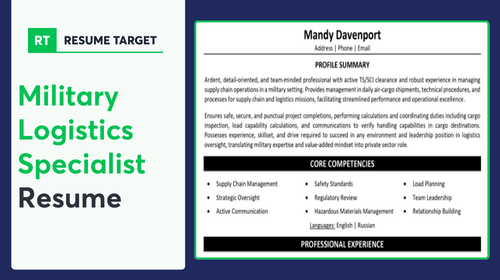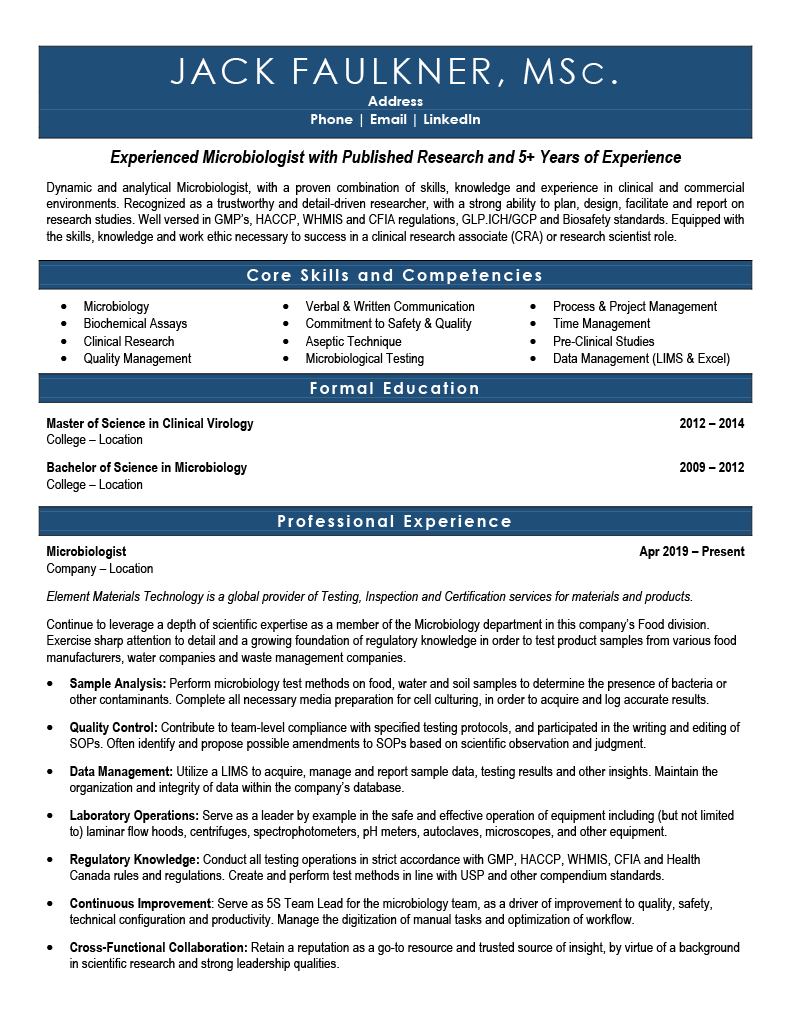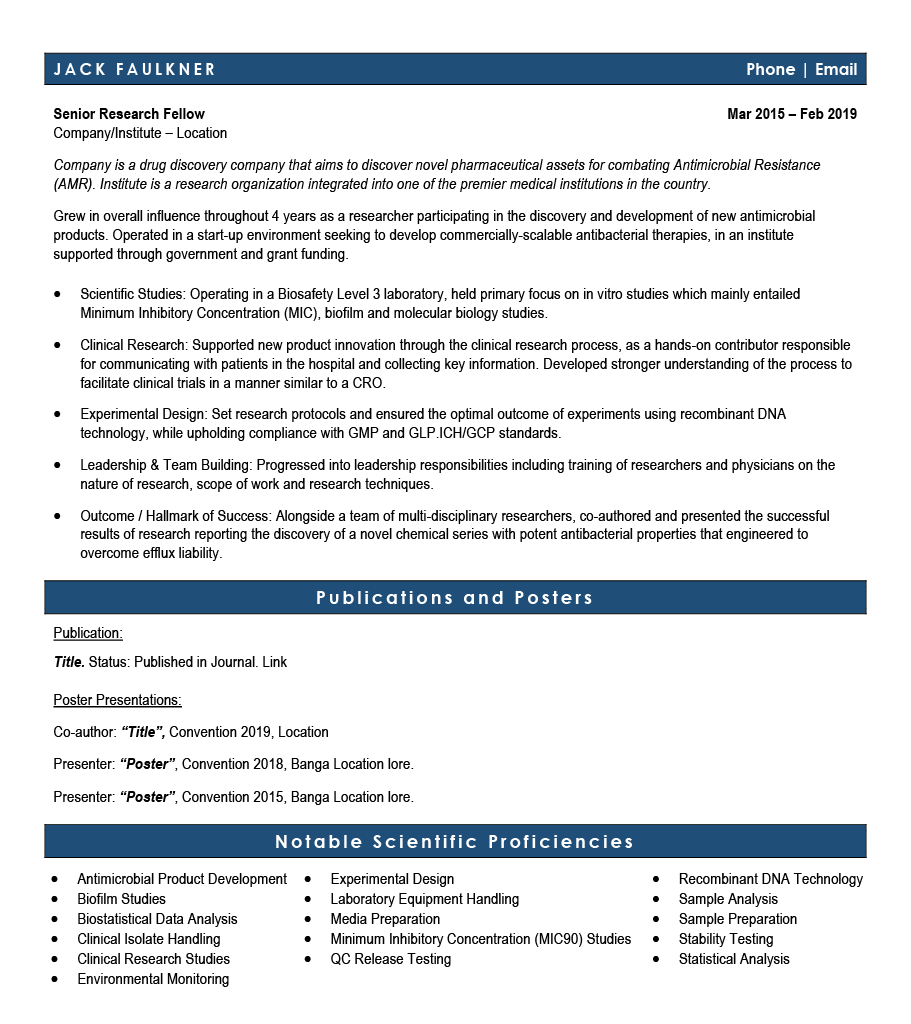

Microscopes and petri dishes don't tell the whole story of your expertise. Many microbiologists struggle to translate complex lab work into compelling resume content that hiring managers understand.
Are you finding it challenging to showcase your technical skills and research impact in a clear, engaging way? Your resume needs to bridge the gap between scientific precision and real-world value, speaking to both technical and non-technical readers.
Resume Target specializes in helping microbiologists transform detailed lab experience into powerful career stories. We know how to present your research achievements, analytical skills, and technical expertise in a way that captures attention and lands interviews.


In a world where microscopic organisms shape everything from our health to our environment, microbiologists serve as the dedicated scientists who conduct vital research to improve sterilization procedures and develop new drugs to combat infectious diseases.
Through careful laboratory experimentation and analysis, these specialists isolate and study various microorganisms, monitor their effects on living things and ecosystems, and translate their findings into actionable insights that advance medical treatments, food safety, and environmental protection.
If you're fascinated by the invisible world of microorganisms and their impact on human health and the environment, a career in microbiology offers diverse opportunities for growth - from specialized research roles in pharmaceuticals to leadership positions in public health laboratories.
Let's talk about what's exciting in the microbiologist field - your earning potential spans an impressive range that rewards expertise and specialization. The most successful professionals in research and development or government sectors command top-tier compensation, while those in pharmaceutical companies, educational institutions, and testing services also enjoy competitive pay packages. Your career path as a microbiologist opens doors to various industries, each offering unique financial opportunities.
Figures from: U.S. Bureau of Labor Statistics
Starting as a Microbiologist opens doors to diverse career paths in research, academia, and management. Your journey can progress from lab work to leading research teams or heading scientific departments, with advanced degrees accelerating growth.
Beyond basic laboratory techniques, advancing in microbiology requires a combination of technical expertise, research capabilities, and leadership qualities.
- Advanced Laboratory Techniques and Analysis - Research Design and Methodology - Data Analysis and Scientific Documentation - Team Leadership and Project ManagementBreaking into microbiology starts with entry-level lab positions where you'll gain hands-on experience with lab techniques, specimen handling, and research protocols while building your professional network.
To advance in your microbiology career, you'll need to develop key competencies including logical-thinking skills to interpret results and strong problem-solving abilities for conducting experiments.
Note: I've kept the introduction concise and informative while maintaining readability, and the transition sentence incorporates specific data from the BLS source while speaking directly to the reader about career advancement requirements.Requirements from American Society for Microbiology
From biotech hubs to government labs, microbiologist roles flourish in coastal research centers and pharma hotspots.
Figures from U.S. Bureau of Labor Statistics
Struggling to translate your complex lab work, research projects, and analytical skills into a compelling microbiologist resume that hiring managers will actually want to read? This comprehensive, section-by-section guide will show you exactly how to showcase your expertise in microbial analysis, laboratory techniques, and research contributions in a way that catches employers' attention.
As a microbiologist, you excel at analyzing complex organisms and conducting detailed research, but condensing your professional story into a few powerful lines can feel more challenging than isolating a difficult strain of bacteria.
While you may be an expert at cell cultures and molecular techniques, translating your laboratory expertise into compelling career highlights requires a different kind of precision - one that helps hiring managers quickly understand your unique value in advancing scientific discovery and maintaining quality control standards.
How would you characterize your primary focus areas within microbiology (e.g., clinical, research, industrial, environmental) and how do they align with your target employer's needs?
Reason: Opening your summary with your specialized focus immediately signals relevance to employers and helps frame your expertise within the vast field of microbiology. This context is crucial for hiring managers to quickly assess fit.
What combination of technical laboratory expertise and analytical methodologies best defines your professional identity as a microbiologist?
Reason: This helps you articulate your unique blend of technical capabilities and analytical approaches, allowing you to craft a summary that positions you as a well-rounded microbiologist rather than listing specific achievements.
How has your experience with quality control, safety protocols, and regulatory compliance shaped your approach to microbiological work?
Reason: Highlighting your understanding of these critical industry requirements demonstrates professional maturity and reliability - key qualities that employers look for in the summary section before diving into specific experiences.
As a microbiologist, you'll need to showcase both your advanced laboratory expertise and your analytical capabilities, from PCR techniques and cell culture methods to data analysis and documentation skills.
Your resume should highlight your proficiency with specialized equipment like microscopes and autoclaves, while also emphasizing critical soft skills such as attention to detail and adherence to safety protocols.
Showcase your laboratory expertise and research impact by organizing your experience into three powerful sections: a concise role overview that sets the stage, quantifiable achievements that highlight your contributions to scientific breakthroughs, and core responsibilities that demonstrate your technical proficiency.
Many microbiologists struggle to translate complex laboratory procedures and research outcomes into clear, compelling achievements that resonate with hiring managers. Transform your technical expertise into powerful success stories by connecting your lab work to measurable impacts on product development, research advancement, and organizational efficiency.
A strong responsibilities section demonstrates how Microbiologists contribute to research, safety, and product development beyond basic lab work. Your duties should clearly show how your technical expertise supports organizational goals while remaining accessible to non-scientific hiring managers.
Your microbiology credentials should highlight your academic background and any specialized certifications in laboratory techniques, biosafety, or specific methodologies. Lead with your highest degree and most relevant certifications, especially those from recognized institutions like the American Society for Microbiology (ASM) or regulatory bodies.
Now that you've created a strong foundation using Resume Target's comprehensive resume writing guidelines, you're ready to transform your CV into a powerful tool for landing your ideal microbiology position.
While many scientists focus solely on customizing their cover letters, tailoring your microbiologist resume for each position is equally crucial, especially given the diverse specializations within the field - from clinical microbiology to industrial fermentation.
A customized resume not only helps you navigate through sophisticated ATS systems scanning for specific microbiology keywords and techniques, but it also demonstrates to hiring managers that your particular blend of laboratory skills and research experience perfectly aligns with their organization's needs.
Ready to turn your resume into a microscope-focused career catalyst? Let's help you highlight the exact scientific expertise each employer is searching for!
Don't let a lack of professional lab experience hold you back! Your journey to becoming a Microbiologist can start with a strong resume that showcases your academic foundation.
Instead of dwelling on unrelated work history, you'll want to emphasize your laboratory coursework, research projects, and any internship experience that demonstrates your understanding of microbial analysis and lab protocols.
Focus on highlighting your technical lab skills, relevant coursework, and any research projects or internships that show your practical experience.
For more guidance on structuring your resume, check out the Student Resume Writing Guide to ensure you're presenting your qualifications effectively.
Your microbiology degree and laboratory experience are powerful assets that deserve to shine in your summary section, setting the stage for your emerging scientific career.
Focus on showcasing your hands-on lab techniques, research projects, and analytical capabilities to demonstrate your readiness for professional laboratory work.
"Detail-oriented and methodical Microbiologist with extensive academic laboratory experience and research project work in microbial identification and analysis. Proficient in aseptic techniques, microscopy, and molecular biology methods through coursework and internship experience at university research facilities. Demonstrated ability to maintain detailed documentation and follow strict safety protocols while assisting with bacterial culture studies. Seeking to leverage strong analytical skills and passion for microbiology to contribute to innovative research in a professional laboratory setting."
Now's your chance to showcase the rigorous scientific training that makes you a qualified microbiologist - from foundational biology courses to specialized lab techniques!
Don't just list your degree - highlight relevant coursework like microbial genetics and cell culture methods, plus spotlight impactful research projects where you mastered key techniques like PCR analysis or bacterial identification.
Microbiology degrees and certifications commonly include courses such as general microbiology, medical microbiology, microbial genetics, physiology, biochemistry, bacteriology, virology, and gene therapy. Certification programs like ASM-WSU Microbiology Certificate Program, Graduate Certificate in Medical Microbiology, and Clinical Certificate in Microbiology are also available.Relevant Coursework: General Microbiology | Medical Microbiology | Microbial Genetics | Physiology | Biochemistry | Bacteriology
Key Projects:
Bacterial Resistance Study: Investigated antibiotic resistance patterns in common hospital-acquired infections using molecular identification techniques and susceptibility testing to determine effective treatment protocols.
Environmental Microbiome Analysis: Conducted comprehensive study of soil microbiome diversity in agricultural settings to assess impact of fertilizer applications on beneficial bacterial populations.
Leverage your academic training, laboratory experience, and technical expertise by showcasing the specialized skills you've developed through coursework, research projects, and internships to create a compelling skills section that catches employers' attention.
As an entry-level Microbiologist, your combination of laboratory skills and analytical capabilities positions you well for roles in research institutions, pharmaceutical companies, or clinical laboratories, where the demand for skilled microbiologists continues to grow.
When you're deep in the lab analyzing complex microbial interactions, the last thing you want to worry about is how to explain your specialized research and technical protocols in a way that hiring managers will understand and value.
At Resume Target, we've mastered the art of translating intricate biotech expertise into compelling career stories that resonate with both scientific and non-scientific readers.
Our proven track record includes helping microbiologists showcase their contributions to groundbreaking research projects, regulatory compliance achievements, and laboratory innovations in ways that capture attention and drive interviews.
With biotech companies rapidly expanding their research teams, don't let an outdated resume hold you back - schedule your free consultation today to transform your scientific expertise into a powerful career marketing tool.
Impress any hiring manager with our Biotechnology resume writing service. We work with all career levels and types of Biotechnology professionals.
Learn More → Biotechnology Resume Writing Services